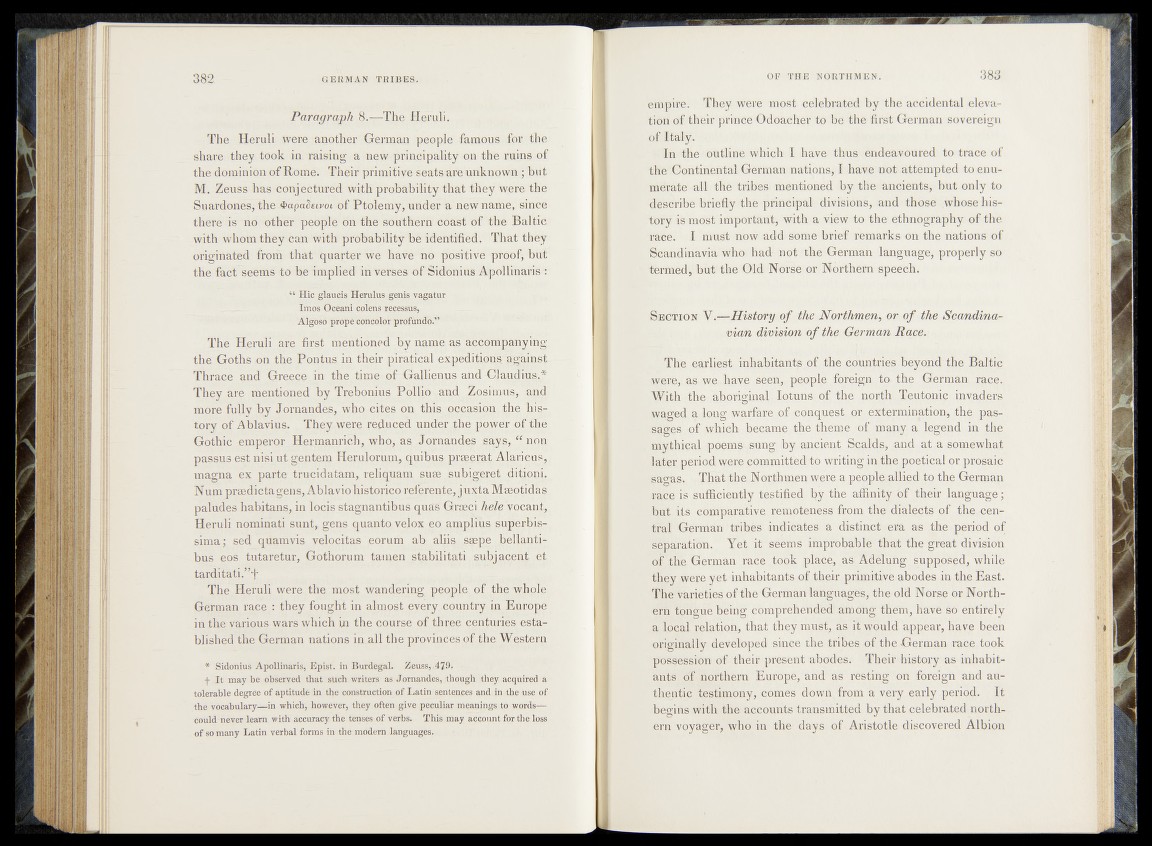
Paragraph 8jBKThe Heruli. •
The Herodi were^apother German ||$gRle famous far. the,
share they took in' raising a new principality on thfe ruins of
the dominiemof Rome. Their primitiveêëà'tsare unknown ; blit
M. Zeuss has'Conjectured with probability that thè^tw^mthe
Suardones, the shapa&uvoi of Ptolethy, under a new natbe,; sincp;
th # $ d s no other peoplg on the Sdiftherri ed&stof the Baltic^
with whom thêÿ^carr witMprohabilit^thè identified; ‘Thht they
PÉgfaated from that quarter we' h a i^ 'n a ^ dm i^ ^ rô ô f j but
the fàctFseêiïtë-to he implied in verses of Sidonius Apollmatis^
•“ Hic glaucis Herulus gënis yagatur
Imos Oceani colens recessus,
• • ‘Xlgosô firopè'boib’coïo^roîcfe^!*''''*'
The Heruli are first mentidhedjmname abcfemSanyin,g,
thirGoths .oh the Pontusin their pird ^ ^ ^ spéâ
Thrace |n d Greece in the^time of-Gallienus aiid -GJahmnsj?
They are mentioned by Trebonjus Pomp > anrt^osir-nn^Vnnd
mope fuilv by Jornandqs, who cites op this occasioni.tfe, hi s-
tory ojF Ablavius. i( They: were reduced under J he.ppjKej,<pj the
Gothic emperor Hermamich- who^ a s Romandes “ non
passus est nisi ubgentèm Herulorum, quibusjnimprai Almicur^j
magna e x parte trupiefatam, rqliquam suæ. ditioiuj '
Numpjragdictagens, Ablavio historico rel'erentcoj uxta
paludes habjtans, in Tpcis stagnantibus quaTQraeci hej.e VocanG
Heruli nominate sunt- geggi quanto, ve)ox eo.ampliua suparbis-
simn • sed quamyis velocitas eorum ab aliis .sqegeJbeUanti-
hus eos tutaretur, Gothorum tamerl stabilitati. subjacent,et
tarditati.”^
The Heruli were the most wandering: people., of the whole;
German race.i they fought in alrqost eye.ry coiintry in Europe
in the v^riouswars which in the course of three centuries established
the German nations injall the provinces of the Western
* Sidonius Apollinaris, Epist. in Burdegal. Zeuss, <473. -
f J t may be observed that such writers as Jornandeg, thoughthêy acquired a
tolerable degree of aptitude in the construction of Latin sentences and .in the use of
the vocabulary—in which* however, they often give peculiar meanings to words—-
eould-never learn with accuracy the tenses of Verbs. This may account for the Ipss
of so many Latin verbal forms in vthe modern languages.
mb'pi re. Theytiwere most- celebrated by the accidental eleva-
%ÏOTÓÏ“'th^ïF prince GdlapM^fo-oP the first German, sovereign
of Italy.
In^eHbutlïn'ê-^V'hiofelf, have thus endeavoured to trace of
natjph^I hav-ë'not attempted to enu-
|^ te te --a llié iè iJSlii#aS>mëntioned by the'iancienfes., but only to
jdé'scVibe hpiefiylthfe principal divMdÉl, and those .whose hisi-
'fifyry is-most important, w ith a ‘view; to -the* ethnography of the
pija%e. I nihst-now-'add# some brief remarks'bn-the nations of
lËcandinaviawho hadsiW'ftlt|i;ë|Germaïi 'language,'properly so
Éerm'edy bhffithe KMd Ner^er-Northern speech.-
S ection V.t—HistoryMf the Northmen^ pr^of the Seandina-
- man division o f the, g e rm a n Race]^ ^
The, eaylLegt^inh abiffin% .of f5t)^e ^couiftriefs,J)twpi.id • the Bal tic
avp &^OH.L-pmple ,fojeigH?,i|» i:ihe German race.
:With -,f^^abd%g^di-Iotuns?qf the north Teutonic invad.ers
waged a, long warfare{©J^canquest.pp* extermination, t|ie passages
of which Jaeq&me the them,e^of drippy a ,J|Me|id in the
Mythical paepisosung by ancient Scalds, anpl atia somewhat
jla.tgr p^pTq^were committedrto writingjn tbe.poeticpl prprosaic
§s^gas. That thp^|J ortbmenwete ape’pplaallied.to the German
dfifee is sufficiently testified tjy the affinity'bf their language;
hut iis Cpfriparative remoteness from the dialects of the, central
German tribes indicates a distinjetoera as the period of
"sjmhration. Yfet it* tseerri's .improbable that the great division,
of the German race^ook placej^aM Adejuhg supposed, while
thpy were yet inhabitants of their primitive abodes in the East.
The varieties of the German languages, the old Norse or Northern
tonkue being comprehended"among them, have so entirely
a local, relatiqip, that, th as ifwouhf appear, have been
originally developed-since the tfibesnof the German race,took
possession of their present abides/' Their-history as inhabitants.,
of northern Eurbpe, and as;'’festihg on foreigtl and au-
theptic testimony, comes 'down from a very early period. It
,begins with the accounts transmitted b y th a t eelebrated porth-
ern voyager, whd in the days of Aristotle discovered Albion